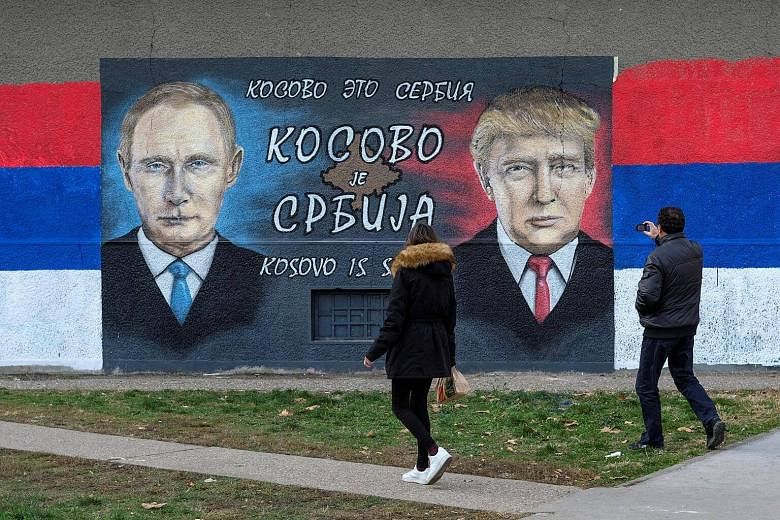WASHINGTON • The decision of top US intelligence officials to give the US President, the President-elect and the so-called Gang of Eight - Republican and Democratic leaders of Congress and the intelligence committees - what they know to be unverified, defamatory material was extremely unusual.
The material was a summary of opposition research memos prepared mainly by a retired British intelligence operative for a Washington political and corporate research firm. The firm was paid for its work first by President-elect Donald Trump's Republican rivals and later by supporters of his Democrat opponent, Mrs Hillary Clinton.
The New York Times said it had checked on a number of the details in the memos but has been unable to substantiate them.
The memos suggest that, for many years, the Russian government of President Vladimir Putin had looked for ways to influence Mr Trump, who has travelled repeatedly to Moscow to investigate real estate deals or to oversee the Miss Universe competition, which he owned for several years. Mr Trump never completed any major deals in Russia, though he discussed them for years.
The former British intelligence officer who gathered the material about Mr Trump is considered a competent and reliable operative with extensive experience in Russia, US officials said. But he passed on what he heard from Russian informants and others, and what they told him has not yet been vetted by US intelligence.
The memos describe sex videos involving prostitutes with Mr Trump in a 2013 visit to a Moscow hotel. The videos were supposedly prepared as "kompromat", or compromising material, with the possible goal of blackmailing Mr Trump. The memos also suggest Russian officials proposed lucrative deals, essentially disguised bribes, in order to gain influence over Mr Trump.
The memos describe several purported meetings during the 2016 presidential campaign between Mr Trump's representatives and Russian officials to discuss matters of mutual interest, including the Russian hacking of the Democratic National Committee and Mrs Clinton's campaign chairman.
If some of the unproven claims in the memos are merely titillating, others would amount to extremely serious, potentially treasonous acts.
One of the opposition research memos quotes an unidentified Russian source as claiming that the hacking and leaking of Democratic e-mails were carried out "with the full knowledge and support of Trump and senior members of his campaign team". In return, the memo said, "the Trump team had agreed to sideline Russian intervention in Ukraine as a campaign issue".
Mr Michael Cohen, a lawyer and adviser to Mr Trump, went on Twitter to deny a specific claim in the opposition research involving him. One of the memos claims that Mr Cohen went to Prague in August or September to meet Kremlin representatives and talk about Russian hacking of Democrats.
Mr Cohen tweeted on Tuesday night: "I have never been to Prague in my life. #fakenews"
On Tuesday, US senators critical of Mr Trump's scepticism of the alleged Kremlin-ordered hacking joined forces to introduce sanctions against Moscow for interfering in the election. The five Democrats and five Republicans laid out expansive new punishments, including visa bans and financial asset freezes against those determined to have carried out cyber attacks on US Democratic offices.
"We should all be alarmed by Russian attacks on our nation," Senate Republican John McCain told reporters, as he also criticised President Barack Obama's outgoing administration for failing to craft a strong strategy for cyber deterrence.
NYTIMES, AGENCE FRANCE-PRESSE
SEE WORLD
Sessions says he will not be a 'rubber stamp'
Nominee Tillerson to voice concerns about Russia
Give the job to James Mattis, say two military policy experts
Retired general sails through hearing, doesn't echo Trump's views
Inauguration next week will ooze 'soft sensuality'
OPINION

